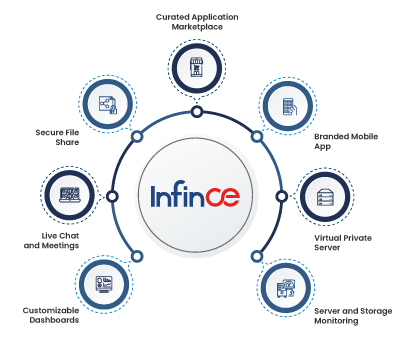We live in a digitally disrupted world that thrives on data and interconnectivity. Businesses that operate with their teams working in silos will find themselves irrelevant and redundant, more so in the newly defined post-pandemic business as usual. Be it a small or large enterprise, collaboration and data exchange across multiple functions or business applications is a significant part of your everyday operations. This is why the need for integration is imminent. On-premises, cloud-native, modern, or legacy applications – integration is the lifesaver of your organization.
Add to this equation an interesting growth projection: In 2020, the enterprise integration market had been valued at USD 9.65 billion; it is now predicted by 2026, it will reach USD 22.69 at a CAGR of 15.42%. So, what can businesses extrapolate from this?
One, data drives innovation and business change, and two, integration is a key feature that is critical to achieving sustained business success and for businesses to remain relevant.
Read more: How Can Organizations Profit More from Collaboration Software?
Furthermore, businesses globally are looking to build their digital resilience in order to stay afloat in the face of change. In this context, simplifying integration as a core asset would be vital as it would mean the following.
- Optimization of business processes: Integration facilitates organizations to build a central framework or software architecture that enables cross-functional teams to connect efficiently and transmit data between multiple systems for better collaboration. This essentially translates to lesser bottlenecks and improved accuracy. Integration eliminates manual, time-consuming processes by significantly minimizing communication delays and increasing efficiency and speed. It automates them to deliver optimized business outcomes driven by high-value strategic processes.
- Better responsiveness and preparedness for change: Integration helps build a conducive environment that embraces change and paves the way for unique technological opportunities. This forms the core of a digital transformation process that translates directly into better business performance by fostering innovation.
- Improved decision-making through data-driven insights: Connected data offers holistic enterprise-wide visibility. Thereby enabling both customers and employees to see the big picture and base their decisions on qualitative evidence and not just on discrete, non-contextual information.
- Reduced costs: By integrating legacy systems with modern infrastructure rather than entirely replacing them, integration drives enhanced revenue and reduced costs. By connecting disparate systems to one another and building a central framework that allows both old and new models to co-exist, integration allows businesses to keep revamping existing infrastructure incrementally.
- Supports cloud initiatives: Existing systems and processes can seamlessly connect to cloud-based services through integration. By connecting to the cloud, organizations typically cut down costs as it precludes the need to invest in separate solutions that serve distinct purposes and instead consolidate several functions under one hood through the cloud.
That brings us to the following question: How do you choose a business platform that makes integration simple?
Simplified integration is at the cornerstone of your organization’s success. Seamless integration across multiple functions and connected processes within an organization helps eliminate silos, prepares an organization for any eventuality, fosters growth and robust development, and drives overall operational as well as strategic efficiency.
Read more: Why is It Necessary to Safeguard Data Privacy in Project Management?
So, what are the essential checklist you should consider while choosing a business platform that simplifies integration?
- Flexibility and API implementation support: A business platform can simplify integration if it works within an agile environment and contributes to a seamless process workflow. This improves efficiency and allows for easy configuration through robust APIs.
- Ability to handle hybrid/coexistence scenarios: Since legacy systems can’t be entirely replaced for modern infrastructure and will need to be scaled appropriately, a business platform should be flexible enough to accommodate integration across multiple scenarios such as cloud-to-cloud, on-premises to cloud, and on-premises to on-premises.
- Strong architecture support: Integration is seamlessly carried out if a business platform supports multiple architectures such as Microservices, SOA & ESB (Enterprise Service Bus).
- High volume data processing. One of the most crucial parameters while considering an integration platform is its ability to process huge volumes of data in seconds. Batch processing support and high-volume requests are vital pre-requisites for a robust integration platform.
- Security: Data security is indeed the most critical aspect to look out for while choosing an integration platform. While choosing an enterprise integration platform, ensure that it is well-built with security features and that the overall flow of data is not dependent on third-party servers.
How does a robust business platform such as Infince be your best bet for seamless integration?
Whether you want to consolidate disparate units of data from enterprise silos, cut down on tedious manual task flows and replace them with automation, or want to leverage key data insights to drive better decisions, Infince is equipped with an array of tools that help facilitate seamless integration across all your business processes and functions.
With Infince that simplifies integration at its core, you will get a bird’s eye view as well as an insightful take into important aspects of your IT infrastructure. This will help you prepare for the future as well as guide you in managing your business operations proficiently. By taking stock of critical trends and changes early on, you will be adept at making evidence-based strategic decisions at a quick turnaround time.
Infince works as your unified business platform to offer meaningful and deep insights into different layers of your IT resources and helps you see how each process/system is interconnected to the other, thereby making integration both simple and seamless.
Get in touch with us to know more about Infince and how it can help your business.






